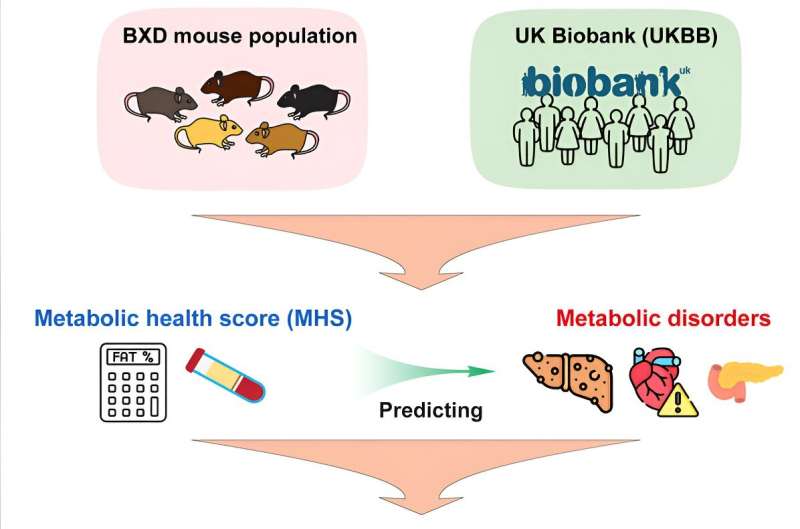This article has been reviewed according to Science X's editorial process and policies. Editors have highlighted the following attributes while ensuring the content's credibility:
fact-checked
peer-reviewed publication
trusted source
proofread
Building a blueprint of metabolic health—from mouse to human

Metabolic syndrome (MetS) is a health condition characterized by a group of risk factors: high blood pressure, high blood sugar, unhealthy cholesterol levels, and abdominal fat. These factors increase the risk of heart disease, type 2 diabetes, and other serious health problems.
Previous studies have shown that both genetics and lifestyle influence MetS. But human studies have found it challenging to pinpoint the disease's exact genetic factors and how they interact with our environment—the differences between people's diets and lifestyles have proven impossible to control.
Now, scientists led by Johan Auwerx at EPFL have addressed the problem by developing a metabolic health score (MHS) based on clinical parameters using a type of mice called "BXD" as genetic reference population. These mice are genetically diverse, much like humans, making them perfect for studying how genetics influence health.
Having developed the MHS, they used it to explore its genetic underpinnings in the mice, validating their findings in human data from the UK Biobank. The study is published in Cell Systems.
The researchers fed 49 different strains of the BXD mice either a standard diet or a high-fat diet from the age of 8 weeks to 29 weeks. Then they measured five key health indicators: body fat percentage, fasting blood sugar, triglycerides, total cholesterol, and fasting insulin levels. From these measurements, they created a metabolic health score (MHS), where a higher score indicates better metabolic health.
Next, they used advanced genetic mapping techniques (quantitative trait locus mapping) to find specific areas in the mice's DNA that were associated with the MHS. Additionally, they analyzed liver gene expression and plasma lipid profiles to uncover molecular signatures linked to MHS. Finally, they looked at gene activity in the mouse livers and analyzed their blood to see how their metabolism was working on a molecular level.
The study also revealed two significant genetic regions on chromosomes 7 and 8 that were linked to metabolic health in a diet-dependent manner. These findings were consistent even when tested in different groups of mice, reinforcing the genetic influence on metabolic health. The study pinpointed two candidate genes, TNKS and MCPH1, which were also associated with metabolic traits in human datasets from the UK Biobank and other cohorts.
The researchers also uncovered that good metabolic health is associated with better management of cholesterol and fatty acids, as well as lower activity in certain cell stress responses and fat storage processes.
Specifically, better metabolic health (a higher MHS score) is linked to lower cholesterol and fatty acid metabolism, reduced mTORC1 signaling (mTORC1 is a protein complex that regulates cell growth and metabolism by responding to nutrients and energy levels), diminished unfolded protein response (a cell stress response that ensures proteins are properly folded and functional), and adipogenesis (making fat cells) in the liver.
The findings highlight potential pathways that could be targeted for therapeutic interventions, and underscore the importance of genetics in metabolic health. The study provides a robust model for studying gene-environment interactions, while the identification of TNKS and MCPH1 as key regulators offers new avenues for understanding and potentially mitigating metabolic diseases.
By translating these findings from mice to humans, the study paves the way for personalized approaches to managing and preventing MetS.
More information: Systems genetics of metabolic health in the BXD mouse genetic reference population, Cell Systems (2024). DOI: 10.1016/j.cels.2024.05.006. www.cell.com/cell-systems/full … 2405-4712(24)00150-9




















